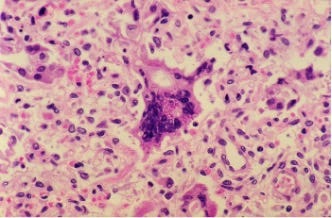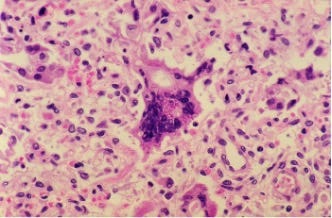Texans are proud people, even in the midst of a calamitous outbreak. They will raise alarms about big government while arresting those who provide abortions. They will deny a climate crisis while enduring one of the most catastrophic snowstorms during a statewide power outage. The pressure to maintain appearances, even when a scourge is present, compels them to tell you why things are bigger and better in Texas. And perhaps they are. (Or maybe I am being unfair, considering that I am from Florida.) In any case, the Lone Star State has recently grappled with its image, primarily because it is the epicenter of the measles outbreak. Many wonder how and why an illness nearly eradicated in the United States in 2000 could experience a resurgence akin to a former but jilted love wanting another chance to prove how potent it can be. In a recent op-ed for The New York Times, one Texan woman explained why the measles outbreak has aggrandized her region.
Many Americans have lost trust in public health agencies and the advice they offer, especially in more conservative parts of the country like mine. That declining trust is showing up in personal choices: In 2018, some 46,000 Texans requested vaccine exemption forms from the Texas Department of State Health Services. In 2024, more than 93,000 did.
She is right to point out that trust in government and public health has significantly eroded in Texas (and elsewhere in the United States) since the onset of the COVID-19 lockdown measures. However, how people explain mistrust closely relates to their political orientation, class, aspirations, and whether they lost someone to COVID-19. More than anything, the troubling cultural wars surrounding health and medicine and people’s access to healthcare also influence how individuals perceive themselves concerning the pandemic. Globally, the United States had the highest number of COVID-19-related deaths, at 1.1 million as of May 2023, and yet those lives are rarely discussed by vaccine and COVID-19 skeptics. For Americans who were essential workers, immunocompromised, or dealing with long Covid, the mistrust stemmed not from an abundance of public health measures but from a perceived lack of sufficient action. Some people felt abandoned, while others believed their rights were being infringed upon.
Yet, missing from some discussions about the current measles outbreak is an understanding of how the disease debilitates the body and why public health has successfully safeguarded most individuals in the United States for a quarter of a century. Measles is one of the most contagious viruses known. When measles enters the lungs, it has one goal: to destroy every tissue in the respiratory, circulatory, and nervous systems. This means that the virus will impair the fundamental functions of the systems that allow you to breathe and think clearly. If you want a flashback to your high school biology class, here is an image of measles attacking a lung.

Call me eccentric, but on a cellular level, the microbe is undeniably intriguing in its ability to replicate and impair other cells. Yet, this visual elegance is precisely what leads to despair among people. Individuals with measles may initially experience mild symptoms: a high fever, a cough, and a runny nose dripping with verdant mucus. A person’s eyes not only water but also display a pinkish-red glow. Beyond that, blotchy rashes will begin to appear erratically on the face and body. However, for those who endure the symptoms, which can last for over ten days, the pathogen can alter one’s consciousness with the force of an axe, cutting off blood flow and leaving people delusional. Even with the best of care, about one in five people contracting measles in the US will end up hospitalized. Additionally, approximately one in every 1,000 people with measles will develop brain swelling due to infection (encephalitis), potentially leading to brain damage. One to three out of 1,000 people with measles will die, even with optimal care.
One thing we know about the current outbreak in the US is that, according to the US Centers for Disease Control and Prevention (CDC), there were 483 confirmed cases across 20 states as of March 31, 2025. While this number may seem minuscule compared to the 1.7 million cancer cases in the United States in 2021, it is significant. Regarding the measles infection, location matters, as more than ninety percent of the cases have occurred in a growing outbreak in Texas and neighboring New Mexico, totaling at least 284 measles infections reported by the CDC. Texas stands as the epicenter of this outbreak; the majority of infections have been reported in West Texas, and one child has tragically died from the disease. Vaccine skepticism has fueled lower vaccination rates in the state, contributing to this outbreak, even though the measles vaccine is quite effective at minimizing infections. Dr. Rachel Herlihy, deputy chief medical officer and state epidemiologist, stated in a CBS News report:
Measles is one of the most contagious diseases we know, but it is also highly preventable. The MMR vaccine provides excellent protection and helps prevent outbreaks like the one we are seeing globally. We urge Coloradans to review their vaccination status and take steps to protect themselves, their families, and their communities.
The outbreaks in the US can influence international events. As of this writing, America is not the only country experiencing increased measles cases. A separate record outbreak in Canada has resulted in a surge of cases across the Americas, prompting the World Health Organization to warn earlier this month that the region's "elimination status" is at risk. Diseases spread because people do. The Ohio Department of Health released a statement confirming this on March 31, 2025. These cases raise concerns about the potential impact in the US and beyond.
Measles is not alone in its resurgence. Other communicable diseases, previously wiped from people’s social memory in the United States, have found new homes here. Whooping cough, another vaccine-preventable disease, has reemerged in Louisiana. The ongoing escalation of multiple preventable epidemics highlights how vaccine hesitancy may be making people more ill and, in the worst case, unnecessarily claiming some lives. Furthermore, even more concerning is that the same individuals allegedly advocating for transparency in the federal government are also cutting the federal health budget. (Those who dissent are disregarded.) Budget cuts to scientific and public health institutions will exacerbate epidemics rather than curtail them.
The CDC recommends that individuals receive two doses of the measles vaccine: the first dose at ages 12 to 15 months and the second between 4 and 6 years. According to the CDC, one dose is 93% effective, while two doses increase effectiveness to 97%. Most vaccinated adults do not require a booster. This remains a recommendation, and individuals can choose in the U.S. According to the West Texan woman, the personal choice to vaccinate in Texas is compared to other medical concerns.
Wanting everyone to have freedom of medical choice isn’t a right-wing political stance; it is a call for personal liberty that goes all the way back to the antebellum and Civil War days. It’s entwined in health care debates ranging from vaccine exemptions to transgender medical care to abortion rights and medically assisted suicide. Balancing the foundational American value of personal liberty with other competing values is complicated and messy, and sometimes excruciatingly tragic.
While her mention of personal choice might be genuine, it seems disingenuous to equate the case for vaccine exemptions in Texas, where autonomy is fully realized, with the struggles of those seeking transgender medical care and abortion access. In Texas, SB14 bans gender-affirming care, and abortion is illegal except when necessary to save the life of the pregnant person (with no exceptions for incest or rape). Despite the Texan’s claim that freedom of choice isn’t a right-wing stance, it has become one in the United States. Personal freedom has become a slogan for the far right, promoting the freedom to refuse vaccination during a measles epidemic while neglecting the ongoing disenfranchisement of marginalized groups in the name of “fetal rights” and religious autocracy.
Of course, no one should be talked down to, shamed, or guilted into being vaccinated. Why aren’t free clinics and town halls discussing science or universal healthcare part of the conversation about trust? What is disheartening is the failure of imagination. We should ask ourselves why individualism takes precedence over everything else to the extent that it risks the lives of the children that many of these freedom-loving Texans claim to care about.
If you like this post, please consider buying my latest book, A History of the World in Six Plagues, which examines the history of epidemics and the rise of public health in the modern era.
Please consider giving a positive review of my book on Amazon, Bookshop, and Goodreads. I would be so grateful if you could recommend the book to people in your life (relatives, coworkers, pen-pals, editors, etc.). You can post about the book on social media, in newsletters, nominate me for a prize, etc.




Sublime. Thank you